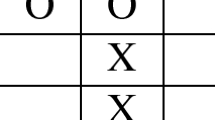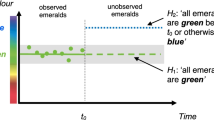Abstract
The focus of much recent debate between realists and eliminativists about the propositional attitudes obscures the fact that a spectrum of positions lies between these celebrated extremes. Appealing to an influential theoretical development in cognitive neurobiology, I argue that there is reason to expect such an “intermediate” outcome. The ontology that emerges is a revisionary physicalism. The argument draws lessons about revisionistic reductions from an important historical example, the reduction of equilibrium thermodynamics to statistical mechanics, and applies them to the relationship developing between propositional attitude psychology and this potential neuroscientific successor. It predicts enough conceptual change to rule out a straightforward realism about the attitudes; but at the same time it also resists the eliminativist's comparison of the fate awaiting the propositional attitudes to that befalling caloric fluid, phlogiston, and the like.
Similar content being viewed by others
References
Churchland, P.M.: 1979, Scientific Realism and the Plasticity of Mind, Cambridge University Press, Cambridge.
Churchland, P.M.: 1981, ‘Eliminative Materialism and the Propositional Attitudes’, Journal of Philosophy 78, 67–90.
Churchland, P.M.: 1985, ‘Reduction, Qualia, and the Direct Introspection of Brain States’, Journal of Philosophy 82, 2–28.
Churchland, P.S.: 1980, ‘Language, Thought, and Information Processing’, Nous 14, 147–170.
Churchland, P.S.: 1983, ‘Consciousness: The Transmutation of a Concept’, Pacific Philosophical Quarterly 64, 80–95.
Churchland, P.S.: 1986, Neurophilosophy, MIT Press, Cambridge, Mass.
Churchland, P.S.: 1988, ‘Replies to Corballis and Bishop’, Biology and Philosophy 3, 393–402.
Cooper, L., F. Lieberman, and E. Oja: 1979, ‘A Theory for the Acquisition and Loss of Neuron Specificity in Visual Cortex’, Biological Cybernetics 33, 9–28.
Finkel, L. and G. Edelman: 1985, ‘Interaction of Synaptic Modification Rules Within Populations of Neurons’, Proceedings of the National Academy of Sciences 82, 1291–1295.
Fodor, J.: 1975, The Language of Thought, Crowell, New York.
Fodor, J.: 1981, ‘Something on the State of the Art’, in J. Fodor, RePresentations, Harvester, Brighton, pp. 1–31.
Fodor, J.: 1988, Psychosemantics, MIT Press, Cambridge, Mass.
Granger, R., J. Ambros-Ingerson, and G. Lynch: 1989, ‘Derivation of Encoding Characteristics of Layer II Cerebral Cortex’, Journal of Cognitive Neuroscience 1, 61–87.
Hawkins, R. and E. Kandel: 1984, ‘Is There a Cell-Biological Alphabet for Simple Forms of Learning?’, Psychological Review 91, 375–391.
Hooker, C.: 1981, ‘Towards a General Theory of Reduction. Part I: Historical and Scientific Setting. Part II: Identity in Reduction. Part III: Cross-Categorical Reduction’, Dialogue 20, 38–59, 201–236, 496–529.
Horgan, T. and G. Graham: 1991, ‘In Defense of Southern Fundamentalism’, Philosophical Studies 62, 107–134.
Jackson, F. and R. Pettit: 1990, ‘In Defense of Folk Psychology’, Philosophical Studies 59, 31–54.
Kamin, L.: 1969, ‘Predictability, Surprise, Attention and Conditioning’, in B.A. Campbell and R.M. Church (eds.), Punishment and Adversive Behaviour, Appleton-Century-Crofts, New York, pp. 279–296.
Lynch, G., R. Granger, M. Baudry, and J. Larson: 1988, ‘Cortical Encoding of Memory: Hypotheses Derived from Analysis and Simulation of Physiological Learning Rules in Anatomical Structures’, in L. Nadel, L. Cooper, P. Culicover, and R.M. Harnish (eds.), Neural Connections, Mental Computations, MIT Press, Cambridge, Mass, pp. 180–224.
Nagel, E.: 1961, The Structure of Science, Harcourt, Brace, and World, New York.
Ramsey, W., S. Stich, and J. Geran: 1990, ‘Connectionism, Eliminativism, and the Fate of Folk Psychology’, in J. Tomberlin (ed.), Philosophical Perspectives IV: Action Theory and Philosophy of Mind, Ridgeway Press, Atascadero, CA. pp. 499–533.
Rescorla, R. and A. Wagner: 1972, ‘A Theory of Pavlovian Conditioning: Variations in the Effectiveness of Reinforcement and Nonreinforcement’, in A.H. Black and W.F. Prokasky (eds.), Classical Conditioning II: Current Research and Theory, Appleton-Century-Crofts, New York, pp. 64–99.
Rumelhart, D. and D. Zipser: 1985, ‘Feature Discovery by Competitive Learning’, Cognitive Science 9, 75–112.
Stich, S.: 1983, From Folk Psychology to Cognitive Science, MIT Press, Cambridge, Mass.
Author information
Authors and Affiliations
Rights and permissions
About this article
Cite this article
Bickle, J. Revisionary physicalism. Biol Philos 7, 411–430 (1992). https://doi.org/10.1007/BF00130060
Issue Date:
DOI: https://doi.org/10.1007/BF00130060




